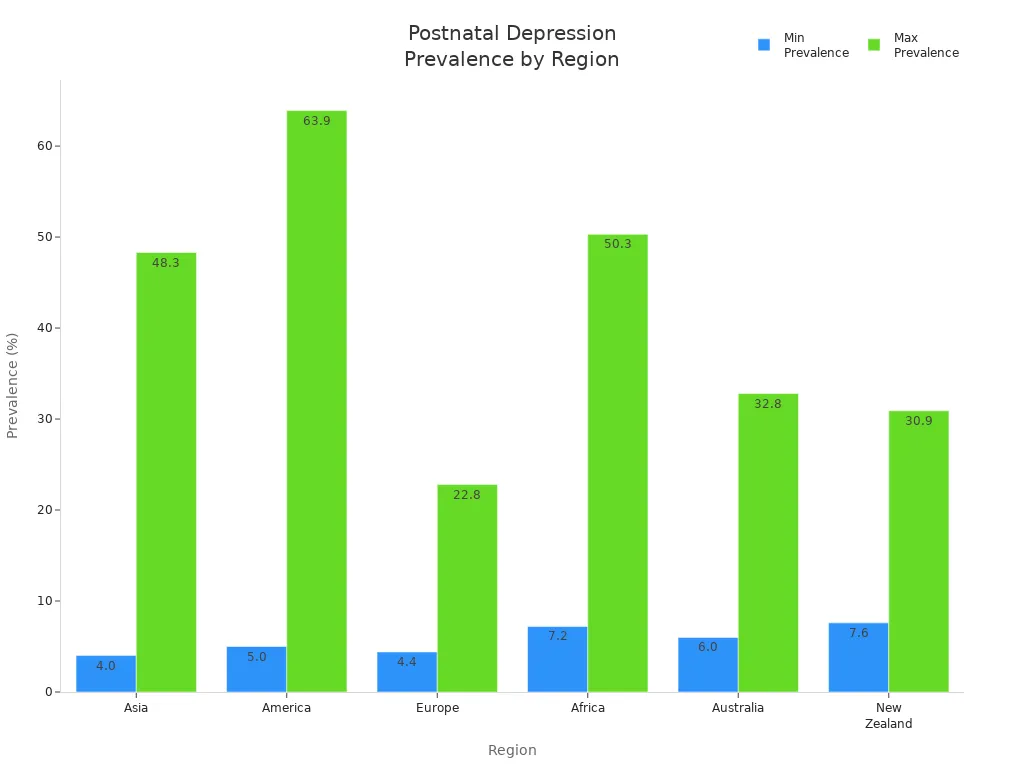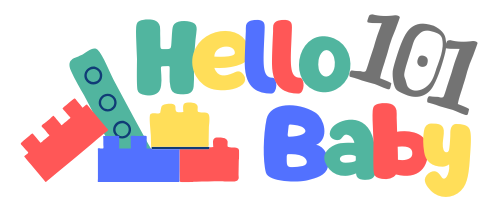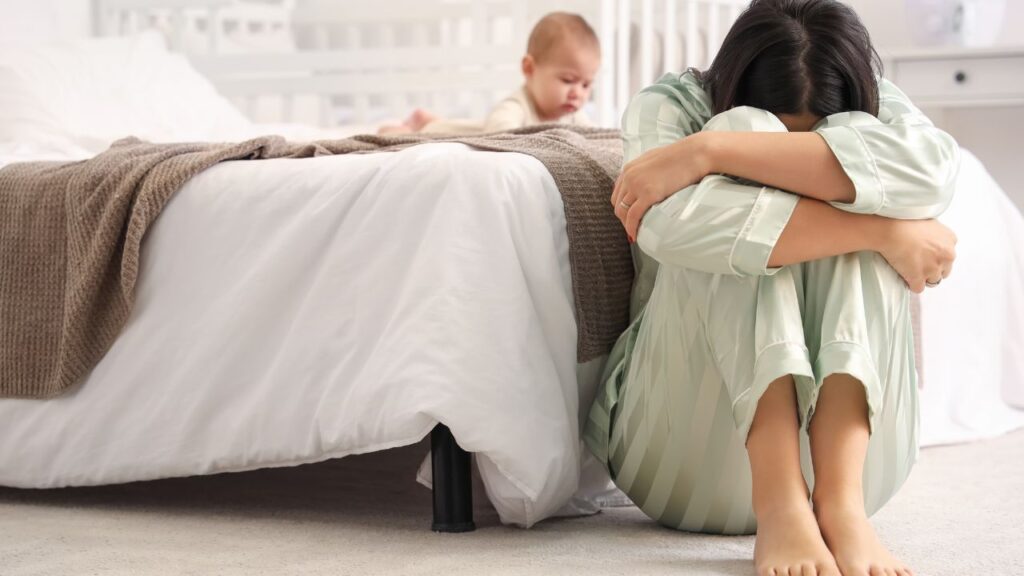You might wonder how to tell the difference between baby blues and postnatal depression. Baby blues usually bring mild mood swings, weepiness, or anxiety that fade within two weeks.
Postnatal depression, on the other hand, lasts longer, feels more intense, and can make daily tasks hard. Most new mothers—up to 80%—experience baby blues, while postnatal depression affects about 10–20%. Here’s a quick look:
| Condition | How Common? | How It Feels | How Long It Lasts |
|---|---|---|---|
| Baby Blues | Up to 80% | Mild mood swings, weepiness | Up to 2 weeks |
| Postnatal Depression | 10–20% | More severe, persistent | Weeks, months, or longer |

If your feelings seem stronger or last longer than a couple of weeks, you’re not alone. Many women feel this way, and support is available.
Key Takeaways
- Baby blues are common. They are mild mood changes. They usually last up to two weeks after childbirth.
- Postnatal depression is more serious. It lasts longer. It can make daily tasks hard. It can make caring for your baby very hard.
- If you feel sad or hopeless for more than two weeks, you should get help. If these feelings get worse, talk to a healthcare provider.
- Support from family, friends, and professionals helps a lot. It can make recovery from postnatal depression easier.
- Simple self care steps can help with baby blues. Resting, eating well, and asking for help can make you feel better.
Baby Blues
What Are the Baby Blues
You might hear people talk about the “baby blues” after childbirth. This term describes a short period when you feel more emotional than usual.
Most new mothers go through it. Baby blues happen because your body goes through big hormonal changes right after your baby arrives. Estrogen and progesterone levels drop quickly, which can make you feel sad, moody, or anxious.
Oxytocin, the hormone that helps you bond with your baby, also changes and can cause emotional ups and downs. On top of that, you might feel tired, stressed, or overwhelmed as you adjust to caring for a newborn. These feelings are normal and very common.
Symptoms
You may notice a mix of emotional and physical symptoms during the baby blues. Some of the most common include:
- Feeling tearful or crying for no clear reason
- Mood swings or feeling more sensitive than usual
- Irritability or feeling easily frustrated
- Worry or anxiety about your baby or yourself
- Trouble concentrating or feeling forgetful
- Feeling overwhelmed by small tasks
- Fatigue from lack of sleep
It’s important to remember that these symptoms are mild and do not stop you from caring for your baby or yourself. You might feel sad one moment and okay the next. Most women experience these ups and downs, and they usually do not last long.
Timing and Duration
Baby blues usually start within the first few days after your baby is born, often between days 3 and 6. You might notice symptoms peak around the end of the first week.
For most women, these feelings fade away on their own within two weeks. If you still feel down or your symptoms get worse after two weeks, it could be a sign of postnatal depression, and you should talk to your healthcare provider.
According to the NHS, up to 80% of new mothers experience baby blues, but the symptoms are temporary and mild. You can read more about baby blues on the NHS website.
Postnatal Depression
What Is Postnatal Depression
Postnatal depression is a type of major depression that happens after you have a baby. Health experts do not see it as a separate illness.
Instead, they call it major depressive disorder with a special timing—either during pregnancy or within the first few weeks after birth. The DSM-5, which doctors use to diagnose mental health conditions, says postnatal depression can start during pregnancy or up to four weeks after your baby arrives.
Some experts believe it can begin even later, sometimes up to a year after childbirth. You might hear people use the term “postpartum depression” as well. Both mean the same thing.
You can face postnatal depression no matter your background. Some things make it more likely, such as a history of depression, high stress, or little support from friends or family. Other risk factors include difficult pregnancies, unplanned pregnancies, or problems during delivery. Even your baby’s temperament can play a role.
If you feel sad, hopeless, or lose interest in things you once enjoyed after having a baby, you could be experiencing postnatal depression. You are not alone, and help is available.
Symptoms
You may notice that postnatal depression feels much stronger than the baby blues. The symptoms can affect your mind and body. Here are some common signs:
- Feeling sad or hopeless most of the day
- Losing interest in activities you used to enjoy
- Trouble sleeping, even when your baby sleeps
- Feeling very tired or having no energy
- Changes in appetite or weight
- Feeling worthless or guilty
- Difficulty bonding with your baby
- Thoughts of harming yourself or your baby
These symptoms can make it hard to care for your baby or yourself. You might find it tough to get out of bed or do daily tasks. If you notice these signs, it is important to reach out for support. The NHS has more information on symptoms and where to get help.
Onset and Duration
Postnatal depression usually starts within the first four weeks after childbirth, but it can begin any time in the first year. Sometimes, you might not notice symptoms right away.
They can appear weeks or even months after your baby is born. Unlike the baby blues, which fade quickly, postnatal depression can last for months if you do not get help.
Some people feel symptoms for up to a year or longer. This is why it is so important to talk to your doctor if you feel down for more than two weeks. Getting help early can make a big difference for you and your family.
Key Differences
Symptoms and Severity
You might wonder how the symptoms of baby blues and postnatal depression really stack up. The main difference comes down to how strong the feelings are and how much they affect your life.
Baby blues bring mild mood swings, some tears, and a bit of worry. You still feel like yourself most of the time, and you can care for your baby. These feelings come and go, and you bounce back quickly.
Postnatal depression feels much heavier. You might feel sad or hopeless almost every day. You could lose interest in things you once loved. Some parents feel so tired or down that even simple tasks seem impossible.
You might have trouble bonding with your baby or feel guilty for no reason. Sometimes, scary thoughts pop up, like hurting yourself or your baby. These symptoms can make it hard to get through the day.
Here’s a quick table to help you see the differences:
| Aspect | Baby Blues | Postnatal Depression |
|---|---|---|
| Onset | Within 2-3 days after birth | Within first few weeks after birth |
| Duration | Usually resolves within a few weeks | Can last up to a year or longer |
| Severity | Milder symptoms | More severe symptoms |
| Impact | Does not interfere with daily care | Makes it hard to care for yourself and your baby |
| Common Symptoms | Weepiness, irritability, anxiety, fatigue, mood changes | Intense sadness, hopelessness, guilt, scary thoughts, withdrawal |
| Treatment/Support | Gets better with rest and support | Needs professional treatment and support |
Baby blues are common and mild. You might cry more than usual or feel moody, but you still manage daily life. Postnatal depression is much more serious. It can take over your thoughts and make it hard to function. If you notice your feelings are stronger or last longer, you might need extra help. You can find more information on the NHS website.
Duration and Impact
The length of time you feel these symptoms also sets baby blues and postnatal depression apart. Baby blues usually show up a few days after birth and fade away within two weeks.
You might feel emotional, but these ups and downs pass quickly. You get back to your normal self without needing medical treatment.
Postnatal depression sticks around much longer. Symptoms can start weeks or even months after your baby is born. Without help, these feelings can last for months or even a year. This condition can make it hard to care for your baby, keep up with chores, or even get out of bed.
You might pull away from friends and family. Some parents struggle to bond with their baby, which can affect both you and your child.
Baby blues:
- Affect up to 80-85% of new mothers.
- Last 1-2 weeks.
- Do not stop you from caring for your baby.
- Go away on their own.
Postnatal depression:
- Affects about 10-20% of new mothers.
- Lasts for months or longer if untreated.
- Makes daily life and caring for your baby very hard.
- Needs treatment from a healthcare provider.
If postnatal depression goes untreated, it can have long term effects. You might face ongoing depression or problems in your relationships.
Your child could have trouble with learning, behavior, or emotions as they grow. Early support and treatment can help you and your baby feel better and avoid these problems.
If you feel like your symptoms are getting in the way of your life, you are not alone. Many parents go through this, and help is available. The sooner you reach out, the sooner you can start to feel better.
When to Seek Help
Warning Signs
You might wonder when your feelings after childbirth cross the line from normal baby blues to something more serious. Clinical guidelines say baby blues usually show up within the first few days after birth and fade within 10 days.
You may feel tearful, irritable, or emotional, but you can still take care of yourself and your baby. If your symptoms last longer than two weeks, get worse, or make it hard to function, you could be dealing with postnatal depression.
Here are some warning signs that mean you should reach out for help:
- Severe mood swings that don’t go away
- Trouble bonding with your baby
- Crying a lot or feeling hopeless
- Withdrawing from friends and family
- Losing interest in things you used to enjoy
- Changes in appetite or sleep that don’t improve
- Feeling tired all the time
- Thoughts of hurting yourself or your baby
If you notice any of these signs, especially thoughts of self harm or harming your baby, contact a healthcare provider right away. You can find more information on the NHS postnatal depression page.
Getting Support
You do not have to face these feelings alone. Support from family, friends, and your community can make a big difference.
Family members can help by listening, helping with chores, or watching your baby so you can rest. Friends and support groups offer a safe space to share your feelings and learn from others who have been through the same thing.
Healthcare professionals recommend regular check ins after birth. Screening tools like the Edinburgh Postnatal Depression Scale help spot symptoms early. If you feel overwhelmed, talk to your doctor, midwife, or health visitor. They can guide you to the right support, whether that means counseling, medication, or connecting you with local resources.
Barriers like stigma, lack of knowledge, or fear of judgment can make it hard to ask for help. Remember, seeking support is a sign of strength, not weakness. Early help can prevent symptoms from getting worse and help you recover faster.
Treatment and Support
Self Care for Baby Blues
You can take small steps to feel better if you have the baby blues. Most new parents find that these feelings fade with time and gentle care. Here are some helpful ways to support yourself:
- Build realistic expectations for yourself and your baby. Try not to compare your journey to others.
- Rest whenever you can. Nap when your baby sleeps or take short breaks during the day.
- Eat healthy foods and drink plenty of water. Good nutrition helps your body and mind recover.
- Move your body with gentle walks or light stretching if you feel up to it.
- Connect with other new parents or join a support group. Sharing your feelings can help you feel less alone.
- Set boundaries with visitors and let others know when you need quiet time.
- Ask for help from friends or family. Let someone watch the baby while you rest or take a shower.
Remember, it’s normal to have ups and downs after having a baby. If you notice your feelings are getting stronger or lasting longer than two weeks, reach out to your healthcare provider.
Treatment for Postnatal Depression
If you think you might have postnatal depression, you have many options for support and treatment. Health experts recommend starting with talking therapies. Cognitive Behavioral Therapy (CBT) and Interpersonal Psychotherapy (IPT) work well for many people. These therapies help you manage negative thoughts and build coping skills. You can find more about these treatments on the NHS postnatal depression page.
Doctors may suggest medication, like certain antidepressants, if your symptoms are moderate or severe. Some medicines are safe to use while breastfeeding, but your doctor will help you choose what’s best for you and your baby.
Peer support groups also help many parents. Studies show that joining a group—either in person or online—can lower feelings of loneliness and improve your mood. You get to share your story and hear from others who understand what you’re going through.
Exercise, like walking with your baby in a stroller, can also lift your mood. The NHS recommends regular activity for mild to moderate depression. Social support from friends, family, or community groups makes a big difference in recovery.
You don’t have to face postnatal depression alone. Early treatment helps you feel better and supports your bond with your baby.
You have learned the difference now. Baby blues are mild and do not last long. Postnatal depression is much stronger and stays longer. Some people think it will just go away, but getting help really matters. If you do not feel better after two weeks, or if things get worse, ask for help. You can find support in these ways:
- Call or text the National Maternal Mental Health Hotline at 1-833-TLC-MAMA. You will get free and private help.
- The NHS website gives advice and local support.
- Postpartum Support International has groups and information for new parents.
You are not alone. Support and treatment can help you feel better and enjoy your baby.
FAQ
What should you do if you think you have postnatal depression?
If you feel down for more than two weeks or your symptoms get worse, talk to your doctor. You can also visit the NHS postnatal depression page for advice and support.
What makes baby blues different from postnatal depression?
Baby blues feel mild and last up to two weeks. Postnatal depression feels much stronger and sticks around longer. You might find it hard to care for yourself or your baby with postnatal depression.
What are some signs you need extra help?
If you have thoughts of hurting yourself or your baby, or if you feel hopeless, reach out for help right away. These are signs you need support from a healthcare provider.
What can help you feel better during the baby blues?
- Rest when you can.
- Eat healthy foods.
- Talk to friends or family.
- Ask for help with chores or baby care.
Small steps like these can make a big difference.



